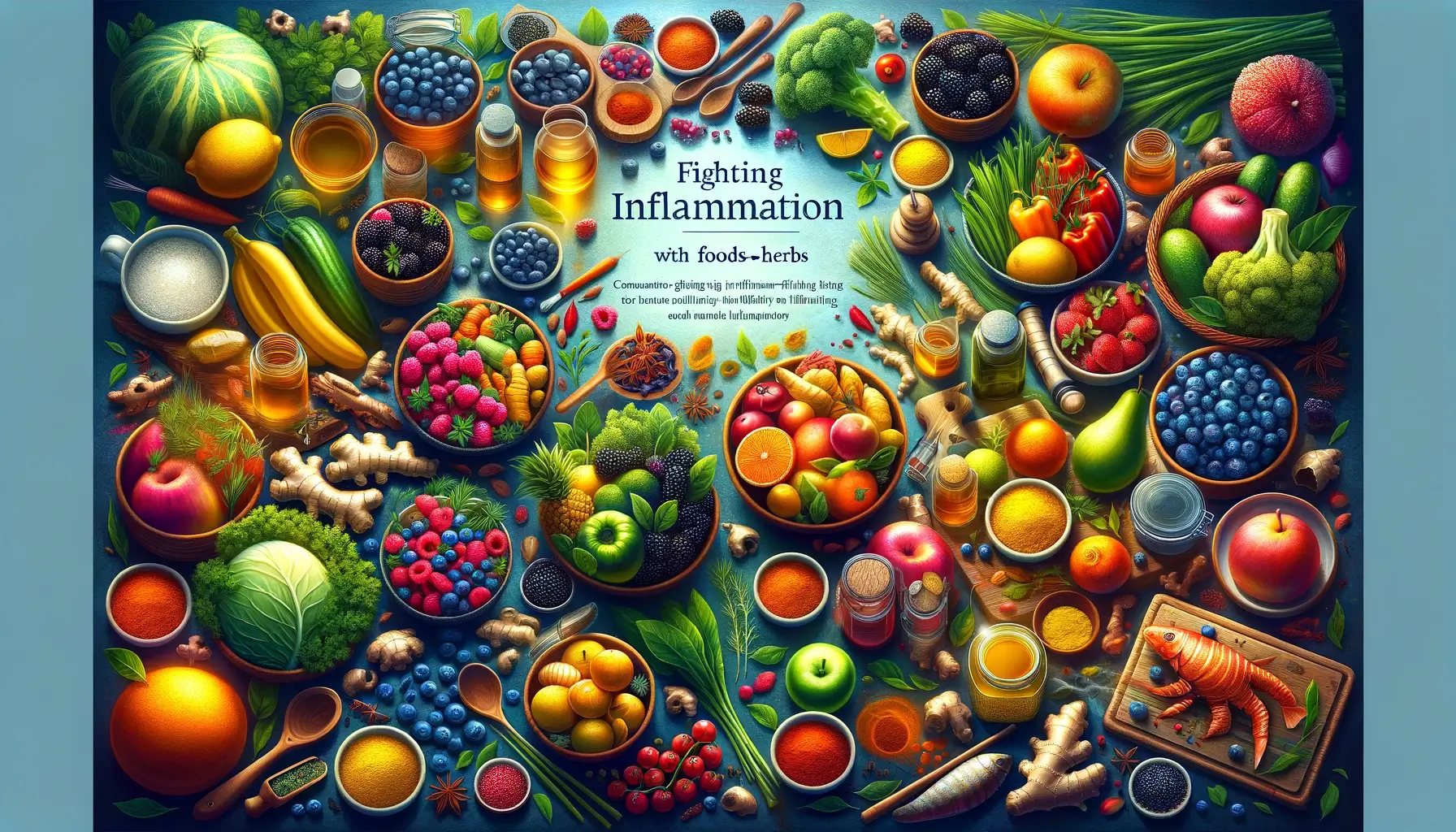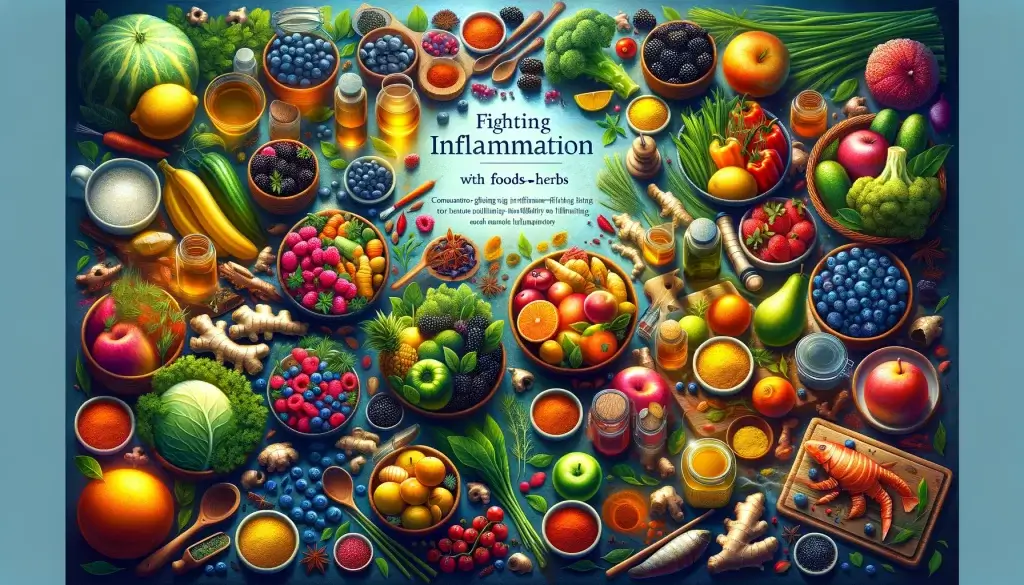Inflammation, a natural immune response to protect the body from harmful stimuli, can become chronic when left unchecked, leading to numerous health issues. However, nature provides us with foods and herbs that possess powerful anti-inflammatory properties to help combat this internal threat. By incorporating these ingredients into our diet, we can potentially reduce inflammation in the body and promote overall well-being. Let’s investigate into the world of natural remedies and discover how we can harness the healing power of foods and herbs to fight inflammation effectively.
Key Takeaways:
- Anti-inflammatory foods: Incorporate foods rich in Omega-3 fatty acids, antioxidants, and fiber like fatty fish, fruits, vegetables, nuts, and whole grains to help combat inflammation in the body.
- Herbs for inflammation: Utilize herbs like turmeric, ginger, garlic, and green tea that possess anti-inflammatory properties and can be easily incorporated into daily meals or consumed as supplements.
- Balanced diet and lifestyle: Maintaining a balanced diet, staying hydrated, exercising regularly, managing stress, and getting adequate sleep are crucial in reducing inflammation and promoting overall health and well-being.
The Inflammatory Response
Any time the body senses a threat or injury, it initiates a complex biological response known as inflammation. This response is a crucial part of the body’s defense mechanism, helping to fight off infections, repair damaged tissues, and maintain overall health.
Biological Underpinnings of Inflammation
Response to inflammation is orchestrated by the immune system, which releases a cascade of chemicals to the affected area. These chemicals increase blood flow to the site of injury, leading to redness and swelling. White blood cells are recruited to the area to neutralize harmful invaders and clean up debris. While acute inflammation is essential for healing, it can become problematic when it persists over time, leading to chronic inflammation.
Chronic Inflammation: A Catalyst for Disease
Any disruption in the body’s inflammatory response can result in chronic inflammation, which is linked to a host of diseases such as heart disease, diabetes, arthritis, and cancer. Chronic inflammation can occur due to factors like poor diet, smoking, stress, or autoimmune disorders. It can slowly damage tissues and organs, paving the way for serious health issues.
Biological Further research is needed to fully understand the intricate mechanisms behind chronic inflammation and how it contributes to disease development. By addressing the root causes of chronic inflammation, we can potentially prevent or manage various chronic conditions and improve overall well-being.
Nutritional Warriors Against Inflammation
Obviously, one of the most powerful ways to combat inflammation is through the foods we eat. Incorporating anti-inflammatory foods and herbs into our diets can have a significant impact on reducing inflammation in the body and promoting overall health.
The Omega Factor: Fatty Acids and Their Role
Acids are not always harmful – in fact, omega-3 fatty acids found in foods like fatty fish, flaxseeds, and walnuts are essential for combating inflammation. These healthy fats help to reduce inflammation at a cellular level, making them key players in the fight against chronic inflammation in the body.
Omega-3 fatty acids have been linked to numerous health benefits, including improved heart health, brain function, and joint health. By incorporating these omega-3-rich foods into your diet, you can help support your body’s natural anti-inflammatory processes and reduce the risk of inflammation-related diseases.
The Color Spectrum: Antioxidant-Rich Foods
Fatty foods are not the only allies in the battle against inflammation. Brightly colored fruits and vegetables such as berries, leafy greens, and colorful peppers are rich in antioxidants that help to neutralize free radicals and reduce oxidative stress in the body. These powerful plant compounds can help to protect cells from damage and support a healthy inflammatory response.
Against the backdrop of modern diets high in processed foods and unhealthy fats, incorporating a wide variety of colorful, antioxidant-rich foods is essential for promoting overall health and reducing inflammation in the body. By embracing the rainbow of nutrient-dense foods available to us, we can nourish our bodies and support optimal health.
Herbs in the Fight Against Inflammation
Green Medicine: Herbal Remedies and Their Efficacy
After millennia of trial and error, humans have discovered the potent anti-inflammatory properties of various herbs. From turmeric to ginger, these ancient remedies have stood the test of time in alleviating inflammation and promoting overall well-being. Herbal medicine offers a natural and holistic approach to combating inflammation, harnessing the power of the earth’s botanical treasures.
With the rise of chronic inflammatory diseases in modern society, the demand for natural remedies has surged. Herbal supplements and extracts are now widely available, offering a gentler alternative to traditional pharmaceuticals. The effectiveness of herbal remedies lies in their organic compounds that target inflammation at its root, providing relief without the harsh side effects of synthetic drugs.
Synergy and Science: The Modern Alchemy of Herbalism
With advancements in scientific research and technology, the efficacy of herbal remedies is now being validated through rigorous studies and clinical trials. Combining traditional knowledge with modern scientific methods, researchers are uncovering the mechanisms behind herbal compounds’ anti-inflammatory properties. This synergy between ancient wisdom and contemporary science is revolutionizing the field of herbalism.
Science has revealed that certain herbs, such as boswellia and ashwagandha, contain bioactive compounds that modulate inflammation pathways in the body. These natural substances act on multiple targets, providing a comprehensive approach to reducing inflammation and promoting healing. The scientific exploration of herbal medicine is unveiling a new frontier in the fight against chronic inflammatory conditions.
Lifestyle and Anti-Inflammatory Practices
Not only are dietary choices important in combating inflammation, but lifestyle factors play a significant role in the body’s inflammatory response. By incorporating healthy habits and anti-inflammatory practices into daily routines, individuals can further support their overall well-being.
Stress, Sleep, and Inflammation: Finding Balance
Lifestyle factors such as stress and sleep can have a direct impact on inflammation levels in the body. Chronic stress can lead to increased inflammation, as the body’s natural response to stress triggers the release of inflammatory markers. Similarly, inadequate sleep disrupts the body’s ability to regulate inflammation, leading to potential health consequences.
It is essential to prioritize stress management techniques, such as meditation, yoga, or mindfulness practices, to reduce inflammation levels. Additionally, quality sleep is crucial for the body to repair and recover, promoting a balanced inflammatory response.
Integrating Diet and Lifestyle: A Holistic Approach
Integrating dietary choices with lifestyle practices creates a holistic approach to fighting inflammation. By focusing on a nutrient-dense diet rich in anti-inflammatory foods and incorporating regular physical activity, individuals can support their body’s natural ability to reduce inflammation.
Practices such as maintaining hydration, limiting alcohol consumption, and engaging in relaxation techniques further enhance the body’s ability to combat inflammation. By adopting a comprehensive approach that addresses both diet and lifestyle factors, individuals can optimize their inflammatory response and promote long-term health.
Final Words
With this in mind, it is clear that the key to reducing inflammation lies in the power of natural foods and herbs. By incorporating anti-inflammatory ingredients like turmeric, ginger, leafy greens, and berries into our diets, we can effectively combat chronic inflammation and its associated health risks. Science has shown us the immense potential of these natural remedies in preventing and even reversing inflammatory diseases. By understanding the impact of our food choices on our bodies, we can take charge of our health and well-being. Let us embrace the wisdom of nature and harness the healing properties of foods and herbs to live a life free from the shackles of inflammation.
FAQ
Q: What is inflammation?
A: Inflammation is the body’s response to harmful stimuli, such as pathogens, damaged cells, or irritants. It is a crucial part of the immune system’s defense mechanism.
Q: How can foods help fight inflammation?
A: Certain foods have anti-inflammatory properties and can help reduce inflammation in the body. These foods often contain antioxidants and other compounds that help combat inflammation.
Q: What are some herbs that are known for their anti-inflammatory properties?
A: Turmeric, ginger, garlic, and green tea are examples of herbs known for their anti-inflammatory properties. These herbs contain compounds that can help reduce inflammation in the body.
Q: Can changing your diet help reduce inflammation?
A: Yes, making dietary changes can play a significant role in reducing inflammation in the body. Consuming more anti-inflammatory foods and herbs while reducing the intake of pro-inflammatory foods can help manage inflammation.
Q: Are there any risks associated with using foods and herbs to combat inflammation?
A: While foods and herbs can be beneficial for fighting inflammation, it is essential to consult with a healthcare provider or nutritionist before making significant dietary changes. Some herbs may interact with medications or have side effects for certain individuals.


